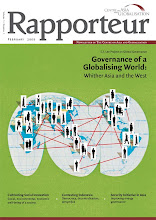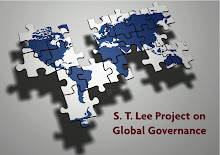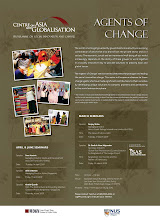
As I write this article, the storm in the financial markets continues -- stock markets in Asia, Europe and the US all are going through roller coaster rides, people fear bank runs and governments are pulling together trillion dollars worth of rescue packages. In this sadly crazy historic moment, when every current option is looking bleak and governments are busy cleaning up the private sector mess, perhaps it is a good time to look some distance into the future toward a gleam of hope for a kinder and gentler form of capitalism. My suggestion for that is to put together effective regional 'social stock exchanges' in each continent that can spearhead social good through capital markets. I believe Asia is ripe to take the lead in meeting this challenge.
What is a social stock exchange? It is a stock market where investors who care about social and economic returns buy stocks and bonds of companies that have strong economic and social returns. Interestingly, in a social stock exchange both not-for-profit and for-profit companies can participate. For-profit entities can either issue shares representing ownership in their companies or issue bonds. Meanwhile not-for-profit companies can utilise the stock exchange to issue bonds an action in itself that can bring operational accountability to the not-for-profit sector (as opposed to carte blanch donations from foundations).
Although Professor
Muhammad Yunus discusses the idea of a social stock exchange in his latest book,
Creating a World Without Poverty, and has been promoting it in lecture circles, the concept is not a new one. There are already several Social Stock Exchanges in operation or in the works, albeit each uniquely different from one another.
BOVESPA in Brazil was the first social stock exchange in the world. It was launched in 2003 with the objective of bringing together non-profit organisations and the social investors who are willing to support their programmes and projects. For BOVESPA investors, the return is solely in 'social profit,' where the investment brings about a more just society with opportunities for the poor and neglected. By providing capital for the non-profit organisations that list on this exchange and the providing social value for the investors who participate in this exchange, BOVESPA aims to change the labeling of non-profit organisations to 'Social Profit Organisations'. So far about 43 Social Profit Organisations have raised capital through this exchange. However, trading of stock in this exchange is still a distant goal.
Europe's answer to social investing is the
FTSE4Good. Set up by FT Stock Exchange in London, FTSE4Good is an index for socially responsible investment. The definition of 'socially responsible' for this index is very broad and covers topics such as: working towards environmental sustainability, developing positive relationships with stakeholders, and upholding and supporting universal human rights. There are about 25 companies in this index. Given FTSE financial requirements, these companies are large for-profit entities which in many cases have very tangential effects on positive social change. Their 'social mission' often springs from the defensive posture of CSR rather than from a genuine effort to make positive social impact.
In North America,
Green Stock Exchange (GREENSX) is attempting to become the Social Stock Exchange for that continent (and Europe). This Canada-based social stock exchange is aiming to launch by end of the year to trade shares in social businesses. GREENSX's definition of social business is a business that makes a profit but benefits society as well delivering a triple bottom line return (economic, social and environmental return). GREENSX's goal is to provide small green issuers access to public equity capital efficiently while ensuring liquidity for the investors. The success of GREENSX remains to be seen.
There is obviously a budding global interest in the notion of social stock exchange. Recently, Rockefeller Foundation donated $500,000 to the UK government to pay for a feasibility study for a social stock exchange. The Foundation picked UK as the site for the feasibility study because of the UK government's support for social enterprises. Existing UK government initiatives include legal reforms for separate incorporation for social businesses and plans for a social investment bank funded with unclaimed assets held by financial institutions.
All this is encouraging in a global perspective; now, how about Asia and, in particular, Bangladesh? Bangladesh is a country that continues to produce remarkable social enterprises, and given the state of the country and the world, it can be expected to keep the pipeline of social innovation flowing. The limiting factor is, of course, capital. Let us move a few degrees east in longitude, and there is a country, which -- though a small dot on the map -- is wealthy, is a player in the financial markets and is itching to make a mark in social business. This country is, of course, Singapore. Singapore is ready, able and perfectly positioned to be the home of Asia's first Social Stock Exchange. Bangladesh is ready, able and perfectly positioned to pepper that exchange with very effective social businesses. This is a match made in financial heaven.
Now, what's the next step? It is very simply for the Bangladesh government to have the vision and desire to initiate a ground-breaking discussion with the Singapore government. Bangladesh is well positioned to make its mark in the next economic revolution of conscious capitalism. It can take its rock star social entrepreneurs Yunus and Abed -- and get them to perform the ground-breaking concert for the social stock exchange for its potential partner Singapore.
Thus, my request to the Bangladesh finance ministry use this opportune moment -- initiate the courtship and get Bangladesh on the global financial map. We are all waiting.
Durreen Shahnaz is the regional managing director of Asia City Publishing Group and adjunct associate professor at Lee Kuan Yew School of Public Policy at National University of Singapore.
 Johannes Linn and Colin Bradford of the Brookings Insitution point out in their latest paper titled "Could the Financial Crisis Push Global Governance Reform?" that the Nov 15 economic summit in Washington DC of the heads of state from the G20 industrailised and developing economies could represent a major step toward a new architecture in global financial and economic relations as a first step in global governance reform more broadly.
Johannes Linn and Colin Bradford of the Brookings Insitution point out in their latest paper titled "Could the Financial Crisis Push Global Governance Reform?" that the Nov 15 economic summit in Washington DC of the heads of state from the G20 industrailised and developing economies could represent a major step toward a new architecture in global financial and economic relations as a first step in global governance reform more broadly.



 Martti Ahtisaari
Martti Ahtisaari









